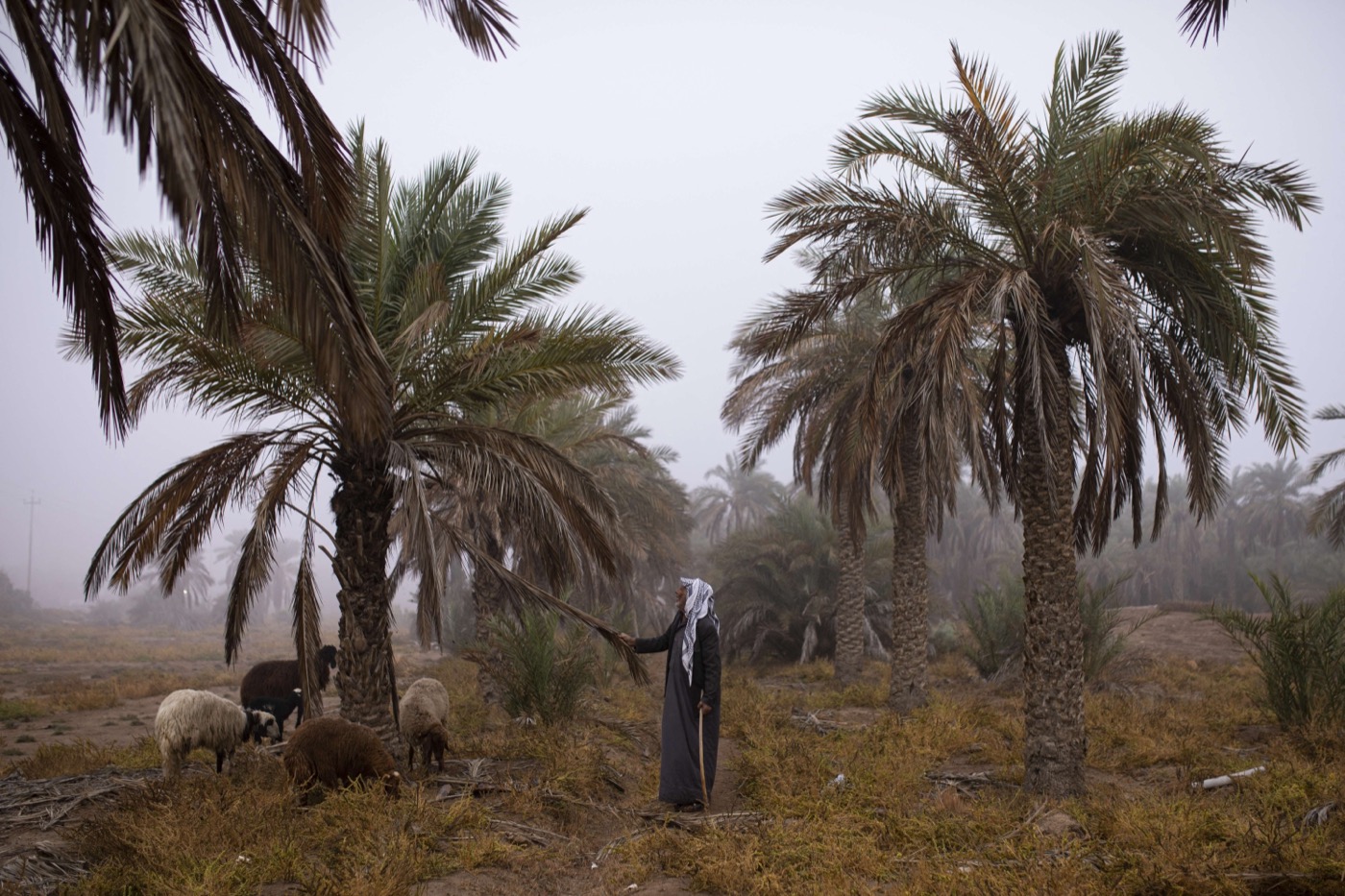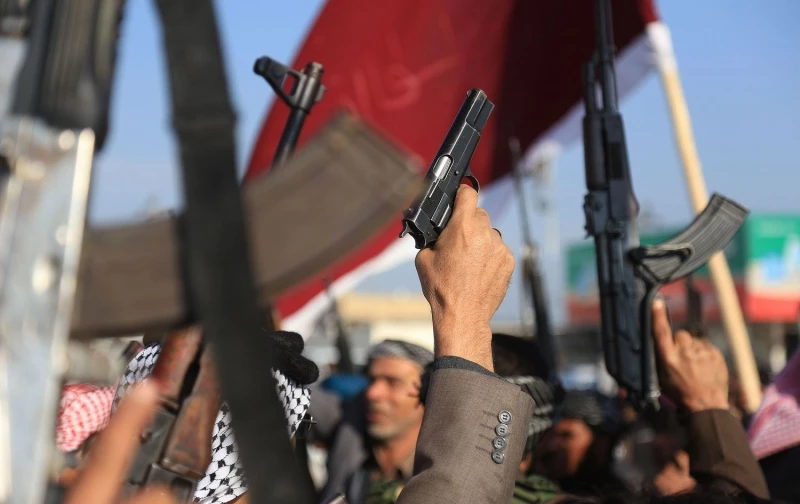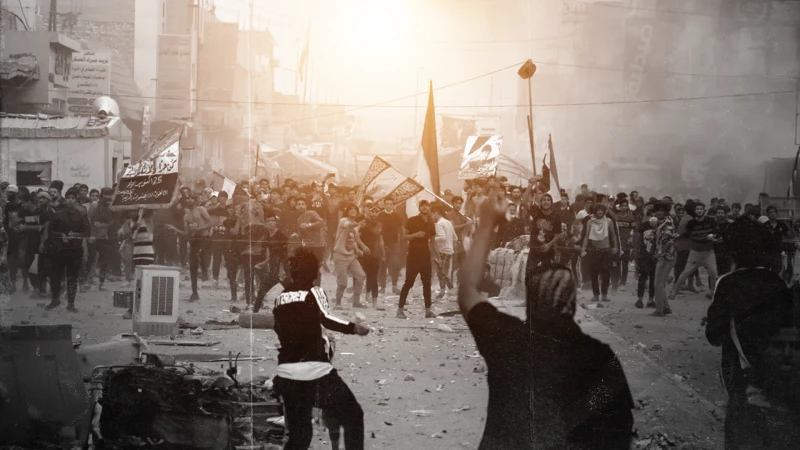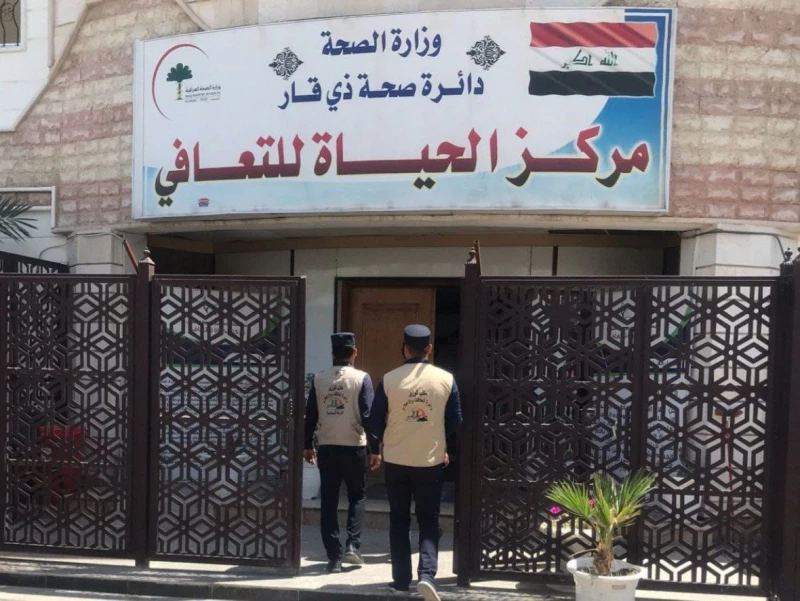THI QAR, Iraq – “Hassan”, 39, made the decision to flee his home in the al-Islah district east of the southern Iraqi city of Nassiriya amid a tribal dispute.
Members of rival tribes had been injured and the fear he might be the next one dead - due to no fault of his own - haunted him.
Hassan is not his real name. Like others here, he makes many decisions on the basis of security concerns. He asked The New Region during a Nov. 7 interview in the Thi Qar province that this fictitious name be used in order to be able to speak freely.
The al-Islah district is not far from that of al-Fuhud, where business has flourished due to its being a safe haven for those fleeing tribal violence.
Prolonged Al-Islah tribal conflict difficult to stop
Two large tribes dominate al-Islah, the Al-Rumayd and Al-Omar. Disputes have raged in recent months between the two under various pretexts.
Sometimes it is a comment on Facebook. Sometimes livestock wanders onto another person’s farmland unintentionally, or sometimes there are quarrels over field irrigation practices.
Issues many might see as not worth losing lives over.
Judges from the Al-Islah and Sayyid Dakhil districts say that have seen significant displacement of residents from their homes in the area due to fears of being targeted by members of the other tribe.
The year 2023 has witnessed one of the longest conflicts of this sort seen in many years, locals told The New Region, prompting senior state officials to intervene in efforts to put an end to them. Increased security measures and the arrest of some of the “troublemakers” failed, however, to quell the violence.
Only when Iraq’s top Shia religious authority, Grand Ayatollah Ali al-Sistani, sent an envoy to halt the strife did precarious calm return.
Facebook ignites conflict and displaces dozens
Conflict broke out in March 2023 against the background of a comment on Facebook that insulted district mayor Ahmed Al-Rumayd, who is from the Al-Rumayd tribe.
Members of his tribe rose up and went to the home of the man – from the al-Omar tribe - who had posted the comment and began shooting as a “warning”.
The next morning, members of the tribe of the man who had posted the comment opened fire on the homes of those accused of taking part in the previous day’s “warning”.
Ahmed Al-Omari, a resident of the Al-Islah district, told The New Region that the conflict has not calmed down since and that it had grown worse the following month.
In April, an officer from the Iraqi National Security Service was shot in the chest when returning home to the district. The officer was also a sheikh from the al-Omar tribe.
The fact that those accused of the crime are from the al-Rumayd tribe aggravated existing tensions and prompted dozens of people from the two tribes to flee to either the nearby al-Fuhood district or to the regional capital, Nasiriyah.
Omari said the armed clashes continued until Grand Ayatollah Sistani sent an envoy on Oct.ober 2 who managed to get the two sides to agree on a deadline for a final solution between the two tribes.
500 students out of school and ‘fake checkpoint’ dangers
Ahmed Nazim Al-Rumayd, the mayor of the al-Islah district, said in a statement that “the tribal escalation has caused the displacement of 114 families from the Al-Rumayd clan and prevented more than 500 male and female students from continuing in their schools.”
He added that “the escalation continues to intimidate families” and that homes had been set on fire.
Sheikh Jamil Youssef from the rival al-Omar tribe addressed the prime minister in a statement in September that said that “there have been attacks by members of the Al Rumayd tribe on the Al Omar tribe using heavy and medium weapons” and “there are fake checkpoints that have been set up in the streets leading to the district”.
He stressed that the situation “exposes members of the al-Omar tribe to danger”, urging the security forces to “intervene and enforce the law”.
The Sayyid Dakhil district suffered significantly from these tribal conflicts, causing the displacement of dozens of residents of rural areas. Out of a total population of 65,000, some 48,900 live in rural areas, which are the focal points of such conflicts.
Sayyid Dakhil mayor Haider Aziz said that approximately 20% of rural residents of the district had been displaced between 2022 and 2023, for the most part migrating to more stable districts nearby.
According to a document obtained by The New Region, the New Generation Mixed Primary School in the village of Albu Hamoudi in the Sayyid Dakhil district was at one point suspended for a full week as a result of a tribal dispute between Albu Hamoudi and the Hasasara “to ensure the safety of students and educational staff”.
A security source told The New Region that the conflict had continued for an entire month intermittently as a result of previous disputes, as a result of which one woman was killed.
Officers targeted as part of the conflict
Two 106 mm Katyusha rockets hit a hill near the village of Al-Hasasara in the Sayyid Dakhil district on November 12, a security source noted to The New Region shortly after it had happened.
The rockets did not explode or cause any casualties, he said. The source noted that the launch site was deemed to have been from one of the locations of a tribe in an ongoing dispute with the Hasasara tribe.
Locals claim the fact that the tribal conflict has been ongoing for months shows the inability of the country’s security forces to put an end to the bloodshed, which terrorizes and frightens civilians. Stray bullets also kill dozens of them, they note.
On November 9, the home of an interior ministry officer with the rank of major general was shot at in the Qalaat Sukkar district north of the city of Nasiriyah as a result of a tribal dispute.
In April last year, Brigadier General Ali Jamil Abd Khalaf, intelligence chief for the Sumer Operation Command, was shot in the Shatrah district of the Thi Qar province, north of the provincial capital Nasiriyah.
Khalaf had gone to the area to resolve a tribal dispute. The bullet killed him immediately.
157 tribal conflicts in January-October 2023
Thi Qar tribal affairs director Col. Qasim Al-Saeedi said 157 tribal conflicts had been resolved in the first ten months of 2023, counting both those involving weapons and others requiring external intervention.
The conflict between the al-Rumayd and al-Omar tribes is one of the longest conflicts this year and has left 6 people dead including individuals from both tribes, he noted. Others sustained injuries from gunfire.
Thi Qar police chief Maj. Gen. Makki Al-Khikani spoke to The New Region about security plans to reduce these conflicts by deploying police and supporting forces in areas where the conflicts occur. He said checkpoints would be set up encircling the areas of concern, following up on those behind the problems.
Arrests will be made and weapons confiscated, he added, and investigative judges would take on the cases, in order to “enforce the rule of law and save citizens’ lives”
Khikani said many of the conflicts occur during the planting and harvesting seasons as a result of water quotas and land irrigation issues.
Teenagers exacerbate existing problems
Sheikh Jassim Muhammad, the sheikh of the Al-Ajrah Al-Sahlan tribe, said that failure to contain crises of these sorts from the very beginning leads to disastrous results and that this is the case with the conflicts in the Thi Qar province as well.
He added that the behavior of young people from the tribe and their failure to consult the sheikh and those directly under him for decision-making have led to armed conflict in the area, exacerbating existing tensions.
Sheikh Nafi’ al-Shami, the sheikh of the Albu Shama clan, told The New Region that he believes instead that the conflicts are due to non-enforcement of the law. He claimed that arrest warrants are issued but not implemented and that tribes purchase unlicensed medium and heavy weapons.
However, he also cited the impulsiveness of many young people and their failure to comply with the decisions of the sheikh as well as the use and abuse of social networking sites such as Facebook and Tik Tok.
He noted that these social media networks are often used to comment on or insult individuals and tribal figures with whom there is a dispute. The sheikh urged greater government oversight.
South Center for Strategic Planning director Salah Al-Musawi claims the ongoing tribal confrontations in Thi Qar and other Iraqi cities is “a clear indication” of the weakness of law enforcement by the state and the spread of uncontrolled weapons.
He stressed that this implies a weak state.
Musawi went on to note that the carrying of weapons by tribes shows that armed factions are competing with the security forces, stressing it is “unreasonable” for them to possess medium and light weapons.
The conflict between them is always the result of a dispute over agricultural land or a trivial comment on social media “not even worth talking about”, he claimed in speaking to The New Region.
In May, Interior Minister Abdul Amir Al-Shammari announced the development of a strategic plan to restrict weapons to the state through a higher committee. This came during a meeting he held with governors and police commanders.
As a result, citizens must register small arms at police stations, while any purchase by civilians of medium and heavy weapons exposes them to criminal liability as established by the law.
Displacement rekindles real estate market in safe areas
Abu Iskandar, the owner of a real estate business in the Al-Fuhood district in the Thi Qar province, began spending long hours at the office after a surge in property prices.
While previously he often sold a mere two plots of land per week, now not more than two hours pass without him selling residential property, he told The New Region. He added that the price of land in his area had doubled within the past six months due to the safety enjoyed by residents of the city and the large number of newcomers who had fled their homes and tribal conflict in al-Islah.
He stressed that this does not mean that al-Fuhood is entirely immune from such conflicts; however, tribal conflicts in this area occur only in distant rural areas and for short periods.
He also noted that the fact that there are a wide variety of tribes in the area and not only two or three large ones also contributes to the generally much safer security situation.
Al-Fuhood resident Muhammad Saleh, who owns a food shop, said that sales had surged and that he almost never gets a chance to take a break.
“I never before saw such business as I am seeing now,” he told The New Region.
Tribal conflicts in southern cities such as Thi Qar remain a reason for the disruption of security that threatens civil peace.
They also, however, serve to revitalize business including that of the weapons trade due to the displacement of many fearing they might be an easy target for anyone wanting to harm their tribe. Some seem to be gaining, while many others are losing out.



 Facebook
Facebook
 LinkedIn
LinkedIn
 Telegram
Telegram
 X
X


